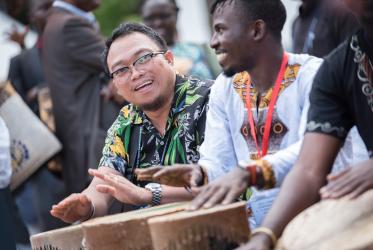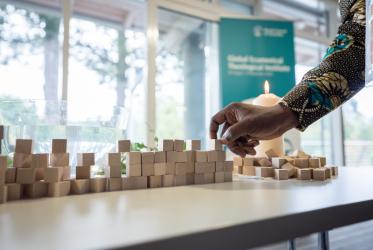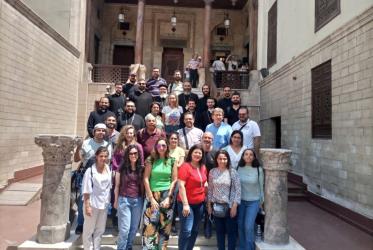Eighteen representatives from theological institutions in Asia met in Bangkok, Thailand, from 17-20 April at a consultation on “Ecumenical Theological Education and Contextual Theologies in Asia” convened by the Ecumenical Theological Education (ETE) department of the World Council of Churches (WCC) with the support of the Foundation for Theological Education in South East Asia (FTESEA), and in collaboration with theological associations and institutions in Asia.
The theological educators shared perspectives on new societal developments in Asia over the past few years, such as rapid economic growth, migration and human trafficking. These and other developments have increased the urgency to revisit the understanding of contextual theologies and the way they are taught at seminaries and universities. Participants observed that the realities and historical locations from which contextual theologies are elaborated in the different countries in Asia are multi-faceted and complex.
A uniformed definition of contextual theologies is therefore not possible, observed Prof. Amélé Ekué, ETE programme executive, and described a similar context of debate in other regions. She proposed to consider describing contextual theology rather as a “travelling notion, which takes its specific contours according to different historical and societal situations.”
The theological educators present at the consultation agreed on the necessity to continuously exchange on the realities, as well as the methodologies which influence the articulation of contextual theologies. Rev. Dr Santanu K. Patro, representing the Board of Theological Education of the Senate of Serampore College in India said “that it continues to be important to look at the objective of liberation in contextual theologies.”
Rev. Dr Henry S. Wilson, executive director of FTESEA noted that consultations like these are at the heart of the foundation’s commitment to promote theological education liberated from Western models.
The consultation also had an inter-regional engagement with the presentation of Prof. Esther Mombo, who spoke about her experiences in guiding students to take their cultural, societal and economic environment seriously for their research work at St Paul’s University in Limuru, Kenya. The possibility of reflecting a theological education theme both from within a specific regional perspective and at the same time to confront these reflections with processes in another region stimulated the debate.
The participants gave expression of their need to develop their own platform of reflection to be able to continue and deepen the dialogue on vital questions of contextualising theological education from an Asian perspective.
Dr Kanan Kitani, a young associate professor from Kyoto, mentioned how important such ecumenical fora of discussion are especially for theological institutions in Christian minority situations, as in Japan.
In her presentation she shared about the recent impact of migration on Japanese Christianity and articulation of contextual theology. She highlighted that “contextual theologies in Asia are very much alive, waiting for Asian theologians to work on a conceptual common ground.” She was supported in her view by Dr Ngurliana from Myanmar who highlighted the necessity to deepen the dialogue on the biblical hermeneutics and methodologies for contextual theologising.
The consultation is part of a series of events organised by ETE to encourage the debate between actors of theological education in different regions of the world.
Learn more about WCC's work on Ecumenical Theological Education





